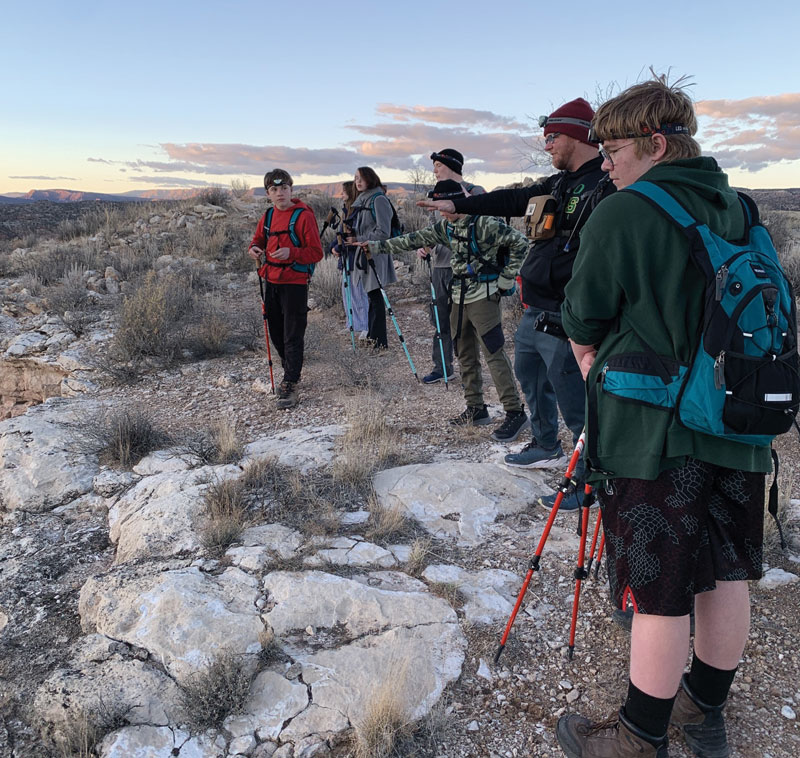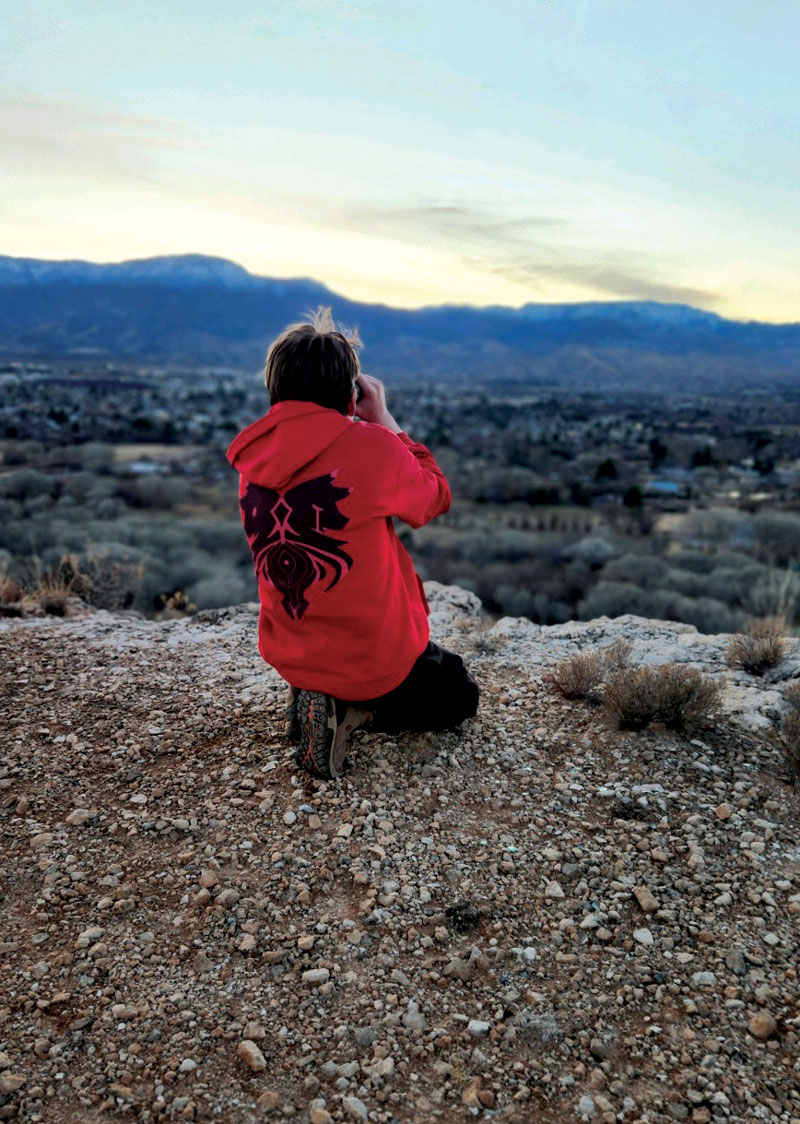Get Outside! Outdoor Programming for Tweens and Teens
One public library's creative initiatives to get young people away from screens and into nature, with tips and best practices for excursions from kayaking and camping to open-air yoga.
 |
The night hike was Cottonwood (AZ) Public Library's most popular nature event.Photos courtesy of Cottonwood Public Library |
When young patrons told Cottonwood (AZ) Public Library (CPL) youth supervisor Danielle Ave that they hadn’t been outside very much since the pandemic started, Ave thought that creating programming to get teens away from screens and into the mountains seemed like a natural solution.
Ave, who has a background in scouting, knows from experience how outdoor experiences can build resilience and confidence during difficult times. With that in mind, CPL started Get Out, programming that has offered outdoor events incorporating survival skills, trail safety, kayaking, and camping, as well as horse therapy, outdoor yoga, pickleball, and disc golf—all geared to provide more out-of-doors experiences for tweens and teens still recovering from the mental and physical toll of the COVID-19 pandemic.
TIPSDon’t overcomplicate the food. Snacks are a must. Teens are famously reluctant to get involved in activities, especially when it requires moving out of their comfort zone, but are easily persuaded with good snacks. But don’t overburden yourself. Bring ready-to-eat, pre-packaged food and drinks or order takeout. Collect necessary information at registration.Gather all necessary information when participants sign up. Have adults sign the permission slip, provide two methods of contact, and answer any important questions, such as about medical information or food allergies. That way, you won’t have to double back later. Know your community.Keep a running list of staff, community partners, and volunteer expertise so you have plenty of people to call on when needed. Importantly, know your teens. Teenagers are much more engaged when they have input in programming. Ask for their recommendations. Give them ownership of the program. |
Funded by the Arizona Librarian Enhancing Resilience in Rural Communities grant program, the events have taken Cottonwood’s teens out of the library, into the mountains, and onto the trail.
“There’s so much stress in our world, and kids don’t always know what to do with that,” says Ave.
Taking teens into nature opens them up to new and healthy ways to deal with the stressors of modern life. They can take those deep breaths, get a hit of vitamin D, calm their bodies—and, of course, have fun.
The programs started in the summer of 2023, and the most popular nature event was the night hike on Cliff Rose Trail. The library partnered with Adventure Outdoors USA, a local outdoor education company, to host a safety training prior to the hike. Teens learned tips on trail safety and hiking at night and received a first aid kit to keep.
On the evening of the event, Ave paired with avid hiker and city parks and recreation employee Jak Teel to take eight tweens and teens onto the trail for an evening walk that culminated with a view of the stars over the Verde Valley.
“The kids were able to experience the night sky in a way you just can’t in the city,” says Ave.
The young hikers in the group enjoyed one another’s company and were planning their future outings before the event ended.
The most ambitious and difficult event to plan was overnight camping. For this, the Cottonwood staff leaned heavily on partnerships with fellow city departments to keep the program safe and affordable.
Ave and her staff took teens to camp overnight in a local park maintained by the city’s parks and recreation department.
“We had to acquire a waiver of the parks and recreation code prohibiting camping in the parks from city council to allow one-time camping at one of our city parks,” Ave says.
The fire department assisted teens with the fire pit set up so the patrons could learn to light a fire with flint and the safe use of propane tanks for cooking. Police patrolled the campsite area overnight to check in on the group.
The event was a hit with the teens, though Ave has ideas of how she would make it easier on herself and staff in the future. Food was the biggest stressor, with health department protocols to consider along with preparing the food.
“Next time, I would just order pizza to be delivered,” she says.
Programs are typically limited to eight participants and require two adult chaperones, who are usually a library employee and a knowledgeable partner from the community.

“We try to choose locations [and programs] that highlight our local community,” Ave says.
The hikes are on local trails, while the horse therapy event took place at the farm of a local therapist. Yoga was in a state park, led by an adult library patron and local yoga instructor. Skills events were hosted through the Elks Society and held at local parks.
With outdoor programs, safety is of the utmost importance. That’s why library staff coordinated with police and fire for the overnight event. An EMT served as a chaperone on one of the hikes. Ave herself serves as Scout Master for local boy scout and girl scout troops, which has informed many of her safety procedures. All trip leaders must carry a Certificate of Insurance filed with the city and are required to produce a fingerprint clearance card as well.
When possible, Ave and her staff lean on the expertise of staff already employed with and vetted by the city. When you’re located in an area that celebrates the outdoors as much as the Verde Valley does, there are many staffers with skills to contribute, both within the library and city departments at large. For example, a library worker who is also an avid kayaker led the kayaking expedition; employees with parks and rec led the native plant and animal identification events.
 |
|
A teen patron takes a picture during the night hike. |
Ave recommends spreading the planning out among several staff and partners. Changing things up not only spreads out the workload, it generates more interest. Cottonwood programs have appealed to a patrons with a diversity of interests and abilities—and not overburdened one staff member or community group. When you’re a small library with staff spread thin, organizing programs such as these that require a lot of up-front planning can be difficult, especially if you’re afraid nobody will show up. Ave and her team talk up the programs with their regular teen patrons to gauge their interest and decide what events to host next. They also encourage teens to sign up for events together, as it’s much easier to come to an event when you know you’ll have a buddy there.
To ensure proper planning for the Get Out programs, Cottonwood requires registration. At first, it was discouraging to have people register then be no-shows on the day of the program. Cottonwood remedied that issue with frequent registration reminders, waitlists, and regular communication with participants, including phone calls two days before to confirm attendance.
Teens and their families now look forward to each Get Out event. The program has been grant-funded, but Cottonwood staff has a plan to continue—with or without the funding.
“You could do an event entirely for free with community partnerships, especially for a hike,” says Ave. Businesses could donate water and snacks, for example. Parents and local outdoor enthusiasts could volunteer their time and expertise for a good—and fun—cause.
“Who knows, maybe your city finance director is an avid hiker or plays disc golf?” says Ave. “Always look for the people who are excited about it. That enthusiasm will trickle down to the kids.”
The program doesn’t have to be complicated. Hit a trail, go to a park, bring a library book to identify native plants and trees. Reconnect with the earth below our feet and the sky above. Remind these kids—and ourselves—that the world is grand, large, and open for adventure. ■
Lisa Bubert is a writer and children’s librarian in Nashville, TN.
RELATED
The job outlook in 2030: Librarians will be in demand
The job outlook in 2030: Librarians will be in demand
ALREADY A SUBSCRIBER? LOG IN
We are currently offering this content for free. Sign up now to activate your personal profile, where you can save articles for future viewing






Add Comment :-
Be the first reader to comment.
Comment Policy:
Comment should not be empty !!!